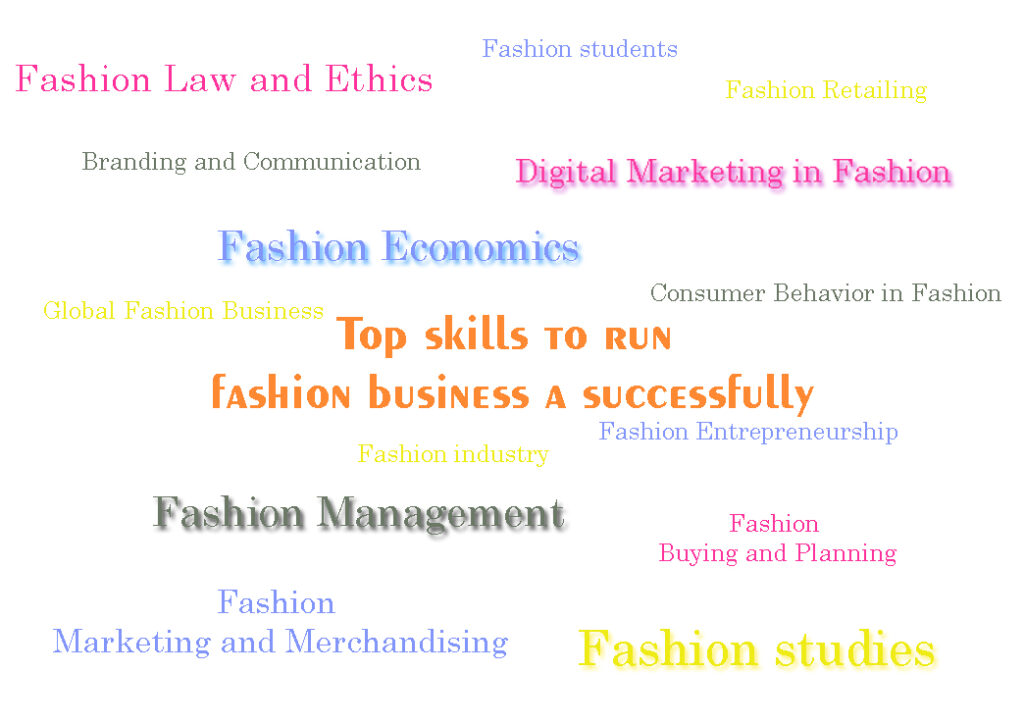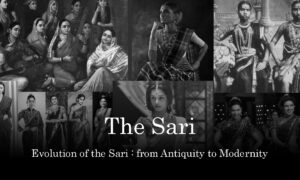11 Top skills to run a successful fashion business
This blog will inform about the 11 top skills to run a successful fashion business. As seen and discussed in my previous post about ‘business of fashion’, the fashion business is a multidisciplinary field that combines aspects of business, marketing, and the fashion industry. In order to make any model of fashion business a success story, the people involved in its running need to focus on a variety of areas.
All these kinds of skills to run a fashion business successfully, are taught in fashion and business schools. This blogpost will discuss all these in detail. Courses or subjects under fashion business programs typically cover a range of topics to prepare students for careers in the business side of the fashion world. Here are some common subjects taught in fashion business programs:
Fashion Marketing and Merchandising
Fashion Marketing and Merchandising, integral components of fashion business education, equip students with the skills to navigate the dynamic intersection of style and commerce. This discipline delves into the intricacies of product development, pricing strategies, and retail management within the unique context of the fashion industry. Students learn to decipher consumer trends, create compelling visual displays, and strategize merchandising plans to captivate target markets.
The curriculum emphasizes the fusion of creativity and business acumen, fostering professionals who can successfully navigate the competitive world of fashion retail. With a focus on market analysis and brand positioning, Fashion Marketing and Merchandising programs empower graduates to drive innovation and profitability in the ever-evolving fashion landscape. This includes product development, pricing strategies, and retail management that are discussed in depth.
Fashion Management
Fashion Management, a cornerstone of fashion education, immerses students in the strategic and organizational intricacies of the fashion industry. This subject matter will teach you and go beyond aesthetics, focusing on leadership, decision-making, and the operational aspects of fashion businesses. Students delve into topics such as supply chain management, strategic planning, and financial analysis tailored to the unique challenges of the fashion sector. With an emphasis on fostering effective leaders, Fashion Management programs produce professionals capable of steering fashion enterprises through complexities. Graduates emerge equipped to navigate global markets, inspire teams, and drive success in an industry where business savvy is as crucial as creative flair.
Fashion Retailing
Fashion Retailing, a pivotal facet of fashion education, immerses students in the dynamic world of retail operations and consumer engagement. This discipline explores the intricacies of managing and merchandising fashion products within a retail environment. Students learn about store layout, visual merchandising, and customer experience strategies tailored to the ever-evolving fashion landscape. With a focus on market trends and consumer behavior, Fashion Retailing programs prepare graduates to navigate challenges in the competitive retail sector. From inventory management to the art of creating enticing retail spaces, students develop the skills necessary to lead successful fashion retail ventures in a globalized and digitally-driven marketplace.
Fashion Buying and Planning
Fashion Buying and Planning are pillar components of fashion education that educate students in the strategic and analytical aspects of curating and managing fashionable merchandise. This subject matter delves into the detailed process of selecting, purchasing, and planning inventory to meet consumer demand and align with market trends. Students learn to conduct trend analyses, negotiate with suppliers, and optimize assortments to maximize profitability. Fashion Buying and Planning programs emphasize the importance of data-driven decision-making, offering insights into supply chain dynamics and inventory control. Graduates emerge equipped to navigate the competitive fashion landscape, influencing the industry through informed and strategic buying practices.

Fashion Economics
Fashion Economics is the backbone of fashion business education. It delves into the economic principles shaping the global fashion industry. Students explore the dynamic relationship between supply, demand, and pricing strategies specific to the different types of fashion products. This stream of study addresses the complexities of production costs, market trends, and the impact of globalization on the fashion marketplace. Fashion Economics programs equip students with analytical tools to assess the financial viability of fashion ventures, fostering a deep understanding of profit margins, pricing dynamics, and sustainable business practices. Graduates emerge prepared to navigate the economic intricacies of the fashion world, contributing to its growth with a strategic economic perspective.
Consumer Behavior in Fashion
Consumer Behavior in Fashion unravels the psychological and sociological aspects influencing consumer choices within the fashion industry. Students will be taught to identify, understand and analyse the motivations, perceptions, and cultural influences that drive fashion-related purchasing decisions. This discipline explores trends, brand loyalty, and the impact of social media on consumer behavior. Fashion schools emphasize the importance of understanding customer preferences, allowing graduates to anticipate and adapt to shifting market demands. With a focus on human psychology and market research, this program equips students with insights crucial for creating successful marketing strategies and fostering connections between brands and their target audiences.
Fashion Branding and Communication
Fashion Branding and Communication a strong element of the fashion business education, coaches the students in the art of building and sustaining compelling brand identities. This discipline explores the strategic use of marketing, advertising, and public relations to cultivate brand recognition and loyalty within the dynamic fashion landscape. Students learn to craft brand narratives, develop visually impactful campaigns, and leverage digital platforms for effective communication. Fashion schools strongly emphasize on the fusion of creativity and strategic thinking with this stream. This field plays a very important role in empowering graduates to navigate the evolving media landscape. With a focus on storytelling and image cultivation, this program equips students to shape brands that resonate authentically with diverse audiences.
Fashion Law and Ethics
As the landscape of human thinking shifts, it reflects in consumer behaviour. One such shift has been the inclusion of Fashion Law and Ethics in the fashion business courses. Integral to fashion education, fashion law and ethics explores the legal and ethical dimensions of the dynamic fashion industry. Students deeply study about intellectual property rights, contracts, and sustainability practices unique to fashion. This discipline addresses issues such as counterfeit goods, cultural appropriation, and environmental impact.
Fashion schools emphasize the importance of ethical sourcing, fair labor practices, and responsible business conduct. Graduates emerge with a deep understanding of the legal framework governing the fashion world and the ethical considerations necessary for socially responsible practices, preparing them to navigate a complex industry while promoting integrity and sustainability.
Fashion Entrepreneurship
Fashion Entrepreneurship usually occupies a focal point in fashion business education. The study of fashion entrepreneurship equips students with the skills to navigate the competitive landscape of starting and running fashion businesses. This discipline delves into business planning, financial management, and innovation within the dynamic realm of fashion entrepreneurship. Students learn to identify market opportunities, create viable business models, and develop strategies for sustainable growth. Fashion schools emphasize the fusion of creativity and business acumen, nurturing graduates who can launch and manage their ventures. With a focus on strategic thinking and adaptability, this program empowers aspiring entrepreneurs to contribute to the innovation and evolution of the fashion industry.
Global Fashion Business
Global Fashion Business, an upcoming and very promising aspect of the fashion business education, educates students in the complexities of the international fashion marketplace. This subject matter explores the intricacies of global supply chains, cross-cultural consumer behavior, and the impact of globalization on the fashion industry. Students learn to navigate diverse markets, address regulatory challenges, and adapt strategies for different regions. Fashion schools emphasize the importance of understanding global trends, fostering cultural sensitivity, and developing a comprehensive view of the interconnected fashion world. Graduates emerge equipped to lead and contribute to fashion businesses on a global scale, fostering innovation and sustainability in an increasingly interconnected industry.
Digital Marketing in Fashion
Digital Marketing in Fashion has been incorporated in the course syllabi of fashion education since the age of online business has started. This extremely vital field of knowledge and education immerses students in the strategic use of digital platforms to promote and sell fashion products. This discipline explores the dynamic intersection of e-commerce, social media, and online branding within the fashion industry.
Students learn to leverage digital channels for effective storytelling, brand engagement, and targeted advertising. Fashion schools emphasize the importance of data analytics, influencer marketing, and e-commerce strategies tailored to the rapidly evolving digital landscape. Graduates emerge equipped with the skills to navigate the online marketplace, connecting brands with global audiences, and contributing to the digital transformation of the fashion industry.
Conclusion
In conclusion, the study of the business side of the fashion industry is not just interesting and intriguing but complex and compelling in many ways. These subjects provide students with a comprehensive understanding of the business side of the fashion industry, preparing them for various roles such as fashion marketing managers, retail buyers, merchandisers, and entrepreneurs in the fashion sector. Keep in mind that specific programs may have variations in their curriculum based on the focus and goals of the institution offering the fashion business education.
Fashion business education is crucial for aspiring professionals, providing a blend of creativity and business acumen essential in the dynamic fashion industry. Notable institutes like the Fashion Institute of Technology (FIT) in New York, London College of Fashion, and Istituto Marangoni in Milan offer comprehensive programs. These institutions equip students with skills in marketing, merchandising, management, and entrepreneurship. The importance lies in preparing graduates to navigate global markets, understand consumer behavior, and drive innovation. By combining practical knowledge with industry insights, fashion business education empowers individuals to thrive in roles such as marketing managers, retail buyers, or successful fashion entrepreneurs. If you wish to read more read this article.




























